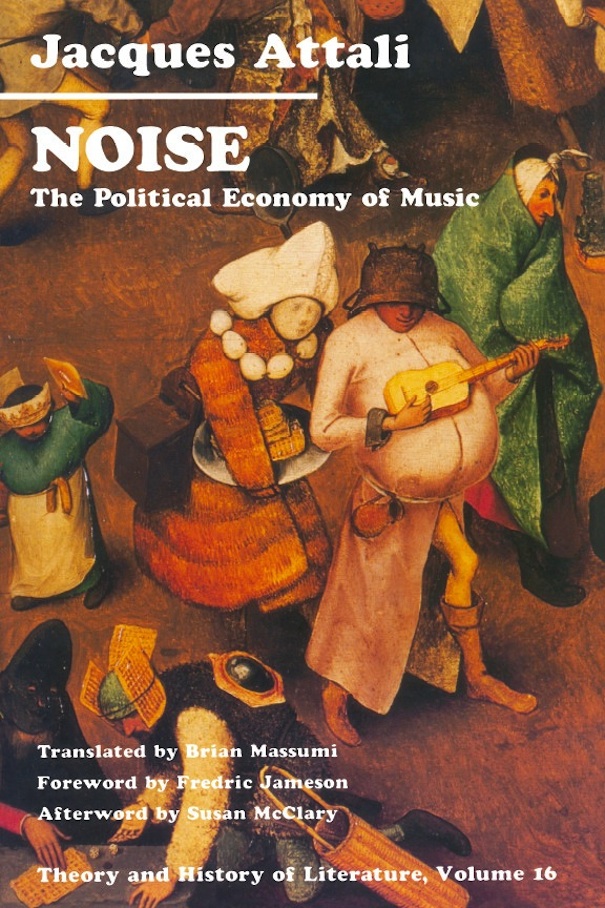Jacques Attali: Noise: The Political Economy of Music (1977–) [FR, EN, ES, TR]
Filed under book | Tags: · cultural economy, cultural production, music, music history, noise, political economy

“Attali’s essential argument in Noise: The Political Economy of Music is that music, as a cultural form, is intimately tied up in the mode of production in any given society. For Marxist critics, this idea is nothing new. The novelty of Attali’s work is that it reverses the traditional understandings about how revolutions in the mode of production take place.
Attali believes that music has gone through four distinct cultural stages in its history: Sacrificing, Representing, Repeating, and a fourth cultural stage which could roughly be called Post-Repeating. These stages are each linked to a certain “mode of production”; that is to say, each of these stages carries with it a certain set of technologies for producing, recording and disseminating music, and also concomitant cultural structures that allow for music’s transmission and reception.”
French edition
Publisher PUF, Paris, 1977
301 pages
English edition
Translated by Brian Massumi
Foreword by Fredric Jameson
Afterword by Susan McClary
Publisher Manchester University Press, Manchester, 1985
Theory and History of Literature, Volume 16
ISBN 0719014719, 9780719014710
179 pages
Reviews: Edinburgh Review (1986), Dana Polan (SubStance, 1988), Ronald M. Radano (Ethnomusicology, 1989), Steven Shaviro (2005), notbored.org (n.d.), J. Szigeti (2014).
Outline: Theodore Gracyk.
Commentary: Eric Drott (Critical Inquiry, 2015).
Bruits: essai sur l’economie politique de la musique (French, 1977, added on 2021-4-11)
Bruits: essai sur l’economie politique de la musique (French, new ed., 1977/2001, added on 2013-9-25, updated on 2021-4-11)
Noise: The Political Economy of Music (English, 1985, updated on 2012-7-24)
Ruidos: ensayos sobre economía política de la música (Spanish, trans. Ana María Palos, 1995, updated on 2021-4-11)
Gürültüden müziğe: müziğin ekonomi-politiği üzerine (Turkish, trans. Gülüş Gülcügil Türkmen, 2005/2014, EPUB, added on 2021-4-11)
Andrew Benjamin, Charles Rice (eds.): Walter Benjamin and the Architecture of Modernity (2009)
Filed under book | Tags: · architecture, city, modernity, urbanism

Walter Benjamin is universally recognized as one of the key thinkers of modernity: his writings on politics, language, literature, media, theology and law have had an incalculable influence on contemporary thought. Yet the problem of architecture in and for Benjamin’s work remains relatively underexamined. Does Benjamin’s project have an architecture and, if so, how does this architecture affect the explicit propositions that he offers us? In what ways are Benjamin’s writings centrally caught up with architectural concerns, from the redevelopment of major urban centres to the movements that individuals can make within the new spaces of modern cities? How can Benjamin’s theses help us to understand the secret architectures of the present? This volume takes up the architectural challenge in a number of innovative ways, collecting essays by both well-known and emerging scholars on time in cinema, the problem of kitsch, the design of graves and tombs, the orders of road-signs, childhood experience in modern cities, and much more. Engaged, interdisciplinary, bristling with insights, the essays in this collection will constitute an indispensable supplement to the work of Walter Benjamin, as well as providing a guide to some of the obscurities of our own present.
Publisher re.press, Melbourne, July 2009
Anamnesis series
Creative Commons BY-NC-ND 2.5 license
ISBN 9780980544022
224 pages
Lorenzo Chiesa, Alberto Toscano (eds.): The Italian Difference: Between Nihilism and Biopolitics (2009)
Filed under book | Tags: · anthropology, biopolitics, communism, critique, democracy, feminism, italy, nihilism, philosophy, politics, social movements

This volume brings together essays by different generations of Italian thinkers which address, whether in affirmative, problematizing or genealogical registers, the entanglement of philosophical speculation and political proposition within recent Italian thought. Nihilism and biopolitics, two concepts that have played a very prominent role in theoretical discussions in Italy, serve as the thematic foci around which the collection orbits, as it seeks to define the historical and geographical particularity of these notions as well their continuing impact on an international debate. The volume also covers the debate around ‘weak thought’ (pensiero debole), the feminist thinking of sexual difference, the re-emergence of political anthropology and the question of communism. The contributors provide contrasting narratives of the development of post-war Italian thought and trace paths out of the theoretical and political impasses of the present—against what Negri, in the text from which the volume takes its name, calls ‘the Italian desert’.
Contents
Antonio Negri, ‘The Italian Difference’
Pier Aldo Rovatti, ‘Foucault Docet’
Gianni Vattimo, ‘Nihilism as Emancipation’
Roberto Esposito, ‘Community and Nihilism’
Matteo Mandarini, ‘Beyond Nihilism: Notes Towards a Critique of Left-Heideggerianism in Italian Philosophy of the 1970s’
Luisa Muraro, ‘The Symbolic Independence from Power’
Mario Tronti, ‘Towards a Critique of Political Democracy’
Alberto Toscano, ‘Chronicles of Insurrection: Tronti, Negri and the Subject of Antagonism’
Paolo Virno, ‘Natural-Historical Diagrams: The ‘New Global’ Movement and the Biological Invariant’
Lorenzo Chiesa, ‘Giorgio Agamben’s Franciscan Ontology’
Publisher: re.press, Melbourne, July 2009
ISBN 0980544076, 9780980544077
Transmission series
Creative Commons BY-NC-ND 2.5 license
180 pages

